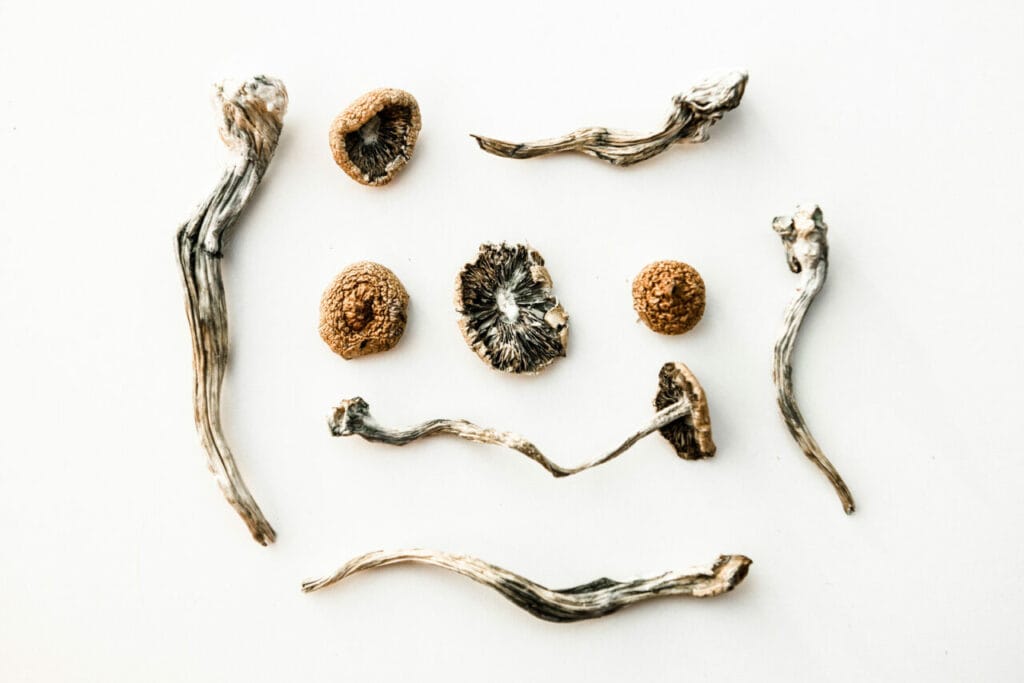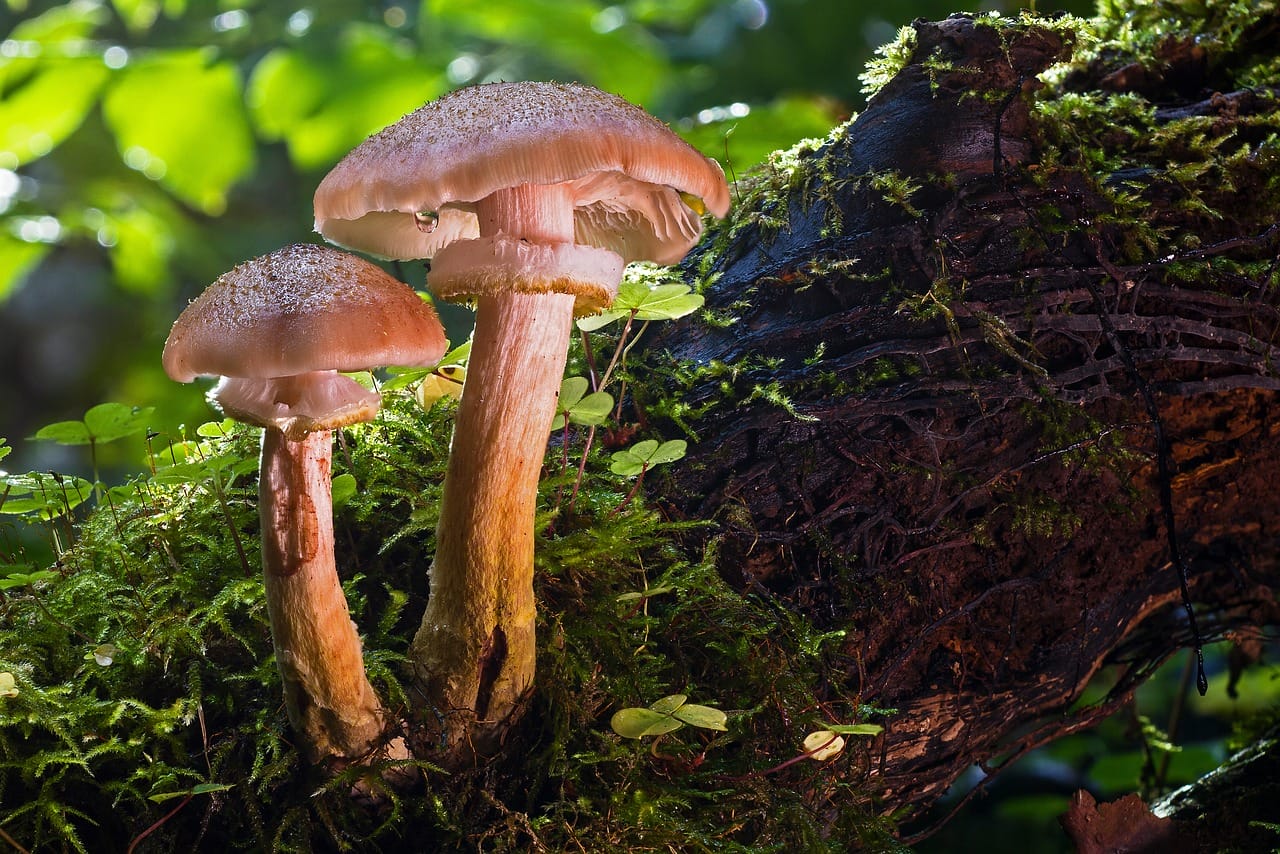Initially, magic mushrooms were perceived by many Canadians as a psychedelic substance primarily used for enjoyment. However, scientific examination of the active component, psilocybin, revealed its powerful potential to treat various mental health conditions.
As more information surfaces, our comprehension of psilocybin’s uses broadens. The more people understand, the easier it becomes to obtain these products through magic mushroom delivery services. A recent research study emphasizes its impact on human consciousness. Could this be the reason behind its profound effect on the human brain? Let’s delve into this fascinating exploration of magic mushroom products.
Key Takeaways:
- Psychedelic magic mushrooms have contributed to the cognitive development of prehistoric humans, aiding their survival.
- The influence of mushrooms on neurological health is substantial, as they have the potential to relieve PTSD, depression, and anxiety.
- The impact of psilocybin on consciousness and brain function could have boosted creativity, introspection, and abstract thinking.

Historical Significance and Usage of Magic Mushrooms
Historical evidence implies our ancestors have been utilizing the power of psychedelic magic mushrooms since ancient times. Indigenous societies used them in sacred rituals and traditional ceremonies to honor their gods. They flourish worldwide, especially in subtropical and tropical areas, such as South and Central America, the Caribbean, Southeast Asia, and Africa.
The Function of Shrooms in Ancient Societies
Since ancient times, the Indigenous peoples of Mexico have relied on these fungi for spiritual enlightenment, divine union, and religious ceremonies. The Aztec Indians of South America referred to it as “God’s Flesh” and incorporated it into healing rituals.
Archaeological discoveries suggest usage dating back to:
- Roughly 10,000 years ago in Australia
- Nearly 7,000 years ago in North Africa
- Around 6,000 years ago in Spain.
Some academics point to these results as evidence of the widespread historical consumption of psilocybin. When people ingested mushrooms, they experienced a sense of joy and hallucinations filled with complex geometric and visual patterns.
Mushrooms’ Contribution to Spain’s Bronze Age History
In the mid-1990s, researchers discovered remnants, notably hair strands from around 200 Bronze Age societies, hidden inside a cave in Minorca, Spain. These artifacts were excellently preserved due to the cave’s entrance being blocked by collapsed rubble. The analysis revealed that these hair samples contained three alkaloids, substances recognized for their ability to alter the human mind and trigger modified states of consciousness.
These discoveries provide intriguing details about the reasons and methods ancient societies used these substances. Surprisingly, achieving an elevated state was quite normal during those times. However, the effect of these substances on human evolution remains a question.
Psilocybin and the “Big Bang Theory” of Human Evolution
In recent years, there has been a revival in psychedelic research, reestablishing the idea that psychedelics contributed to the evolution of consciousness. This notion, known as the stoned ape theory, was proposed by ethnobotanist Terence McKenna. The theory posits that the use of psychedelics might have influenced the cognitive and cultural evolution of humans.
According to Dr. Thomas Falk, a professor of Philosophy and Education at the University of Dayton, this theory could potentially account for the so-called “creative explosion” that took place amongst Homo sapiens around 40,000 years ago, signifying a notable progression in early human cognitive capabilities.
It is speculated that psychedelics enabled early humans to exist in self-created worlds. Over time, their enhanced cognitive abilities allowed them to replicate these experiences in their physical environment.
Terence McKenna’s “Food of the Gods” put forward his arguments that the stoned ape hypothesis is anchored in ancient shamanistic practices and a theorized variety of plants and fungi.
“Capability to Trigger Neurological and Psychological Alterations”
Psychoactive substances have the potential to initiate significant neurological and psychological transformations. These changes could have potentially played a substantial role in the development of our species.
The study uses a multidisciplinary approach, combining biology, ethnobotany, and neuroscience, to examine current research on psilocybin and human consciousness. The theory is that early humans, exposed more frequently to animal dung as their habitat shifted from forests to grasslands, started consuming more of these fungi. The “stoned ape” hypothesis, mentioned in the study, proposes that this change in diet may have triggered significant transformations in the brains of early hominids.
Effects of Ingesting Psychoactive Substances
Eating these fungi could potentially boost hunting and scavenging abilities, increase sexual appetite, and heighten sensory perception. Coupled with the influence of psilocybin on consciousness and brain function, these elements might have inspired creativity, self-reflection, and abstract thinking, all key factors in the development of language.
The Peruvian researchers responsible for the study emphasize the need for more research into how these substances affect the brain and human evolution. While they have impacted areas of the brain involved in memory, decision-making, and self-reflection, the evolutionary implications are still being actively explored.
An independent genetic study indicates that magic mushrooms first appeared around 67 million years ago. Humans began consuming these fungi millions of years ago, well before marijuana was introduced.
What are Dried Magic Mushrooms?
They contain a hallucinogenic substance called psilocybin. The effects can vary depending on individual tolerance, body weight, and method of consumption. The expected effects include:
- Profound joy
- Feeling of tranquility
- Spiritual enlightenment and self-examination
- An unreal sensation of being disconnected from physical surroundings
- Enhanced visual perceptions, such as seeing light halos and vibrant colors
- Heightened sense of well-being
In addition to its recreational use, many people use it for its medicinal benefits, particularly its positive effects on brain health.
Influence on Neurological Health
The active compound alters mood, perception, and cognition by engaging with serotonin receptors in the prefrontal cortex. The augmented cognitive abilities, including the manipulation of visual and auditory experiences, enhance one’s task performance.
Connection to Ancestry
Our early ancestors, notably the hypothesized stoned apes, can be tied to these same principles. Their discovery and use of these fungi, particularly during their ecological transition from forest to grassland habitats, resulted in increased contact with animal feces, thereby increasing their consumption of these mushrooms. The “stoned ape” theory, as cited in the study, suggests that this dietary shift could have initiated significant changes in the brain structures of early hominids.
The intake of psilocybin mushrooms may have influenced the evolution of their consciousness and cognitive capabilities. This might elucidate how they gained crucial survival abilities.Present and Future Implications
Recent research indicates that individuals afflicted with conditions such as cluster headaches, anxiety, anorexia, obsessive-compulsive disorder, PTSD, and depression typically exhibit low serotonin levels. Although selective serotonin reuptake inhibitors (SSRIs) are commonly used for treatment, they often require a significant amount of time to demonstrate efficacy. Conversely, shrooms have the capacity to prompt immediate alterations in brain neuron connectivity.
Modern Psychedelic Research – Clinical Trials
Since the early 2000s, scientists have been exploring innovative treatments specific to individual patient needs for various psychiatric and behavioural disorders.
Due to its capacity to enter the central nervous system and improve cognitive functioning, it has proven effective in therapy. Advancements in research in 2020 suggest that psychedelic therapy using psilocybin products eases severe depression.
As articulated by Matthew Johnson, a professor at Johns Hopkins Medicine, these substances modify the interaction between different brain systems. There is a visible increase in connectivity between brain regions that typically don’t communicate effectively. Conversely, regions that usually interact frequently show a reduction in communication.
This induced disarray is not merely a side effect but holds potential therapeutic value. Individuals suffering from depression often fall into self-critical, recurrent thought cycles that worsen their condition. Psychedelics disrupt these patterns, allowing individuals to detach from their deeply rooted negativity during a psychedelic experience. This leads to more flexible thinking and the capacity to handle critical
Discover the Healing Power of Magic Mushrooms: Order Online Today
Choose from a diverse array of regulated substances available online. Our selection of lab-tested products ensures you avoid accidentally buying toxic mushrooms. Reliable vendors assure the quality and safety of the products they sell.
| Product | Psilocybin Content | Psilocin Content | Benefits |
| Enigma | 0.76% | 0.07% | Boosts Focus and Provides Uplifting Effects |
| Atlantic Treasure Coast | 0.59% | 0.08% | Improves Concentration, Stimulates Creativity, Encourages Neuroplasticity |
| Blue Magnolia | 0.58% | 0.08% | Enhances Memory, Assists in Managing Depression and Anxiety |
| Cambodian | 0.45% | 0.06% | Helps Treat PTSD and Anxiety, Supports Substance Abuse Recovery, Boosts Mood |
Unveiling the Hidden Potential of Magic Mushrooms
All the progress we observe today, including the establishment of civilizations, urbanization, and societies, stems from numerous advancements. Although the stoned-ape hypothesis may simply be a theoretical debate, scientists are gradually discovering evidence that validates the significant role of psilocybin in human evolution.
If you’re after enhanced cognitive development, Powerful Magic Mushrooms Canada is your one-stop destination for magic mushroom delivery. We offer a broad range of top-notch shrooms from A to Z, with fast shipping available across British Columbia and beyond.
Embrace the future of personal growth — explore our collection of premium psychedelics online Canada today.
Commonly Asked Questions
What kind of mushrooms did ancient civilizations consume?
Diverse species of fungi exist worldwide, which means there isn’t a single type universally consumed by all cultures. Some communities preferred the popular liberty caps, while others opted for Psilocybe cubensis. Most of these mushrooms were either consumed raw or transformed into edible forms like tea blends.
What role do psychedelics play in modern human advancement?
In the modern era, psychedelics primarily function by activating the 5-HT2A receptor subtype. This interaction has proven beneficial in managing conditions related to stress and significantly impacts creativity and social behavior. These effects potentially enhance adaptability and survival, especially in societies that greatly rely on knowledge and social collaboration.
Did human evolution benefit from spiritual practices involving shrooms?
Certainly, human evolution was influenced by spiritual practices that involved shrooms, as they helped shape our cultural, religious, and social frameworks. They foster a deep sense of unity, inventive thinking, and community cohesion.
Articles You Might Find Interesting:





